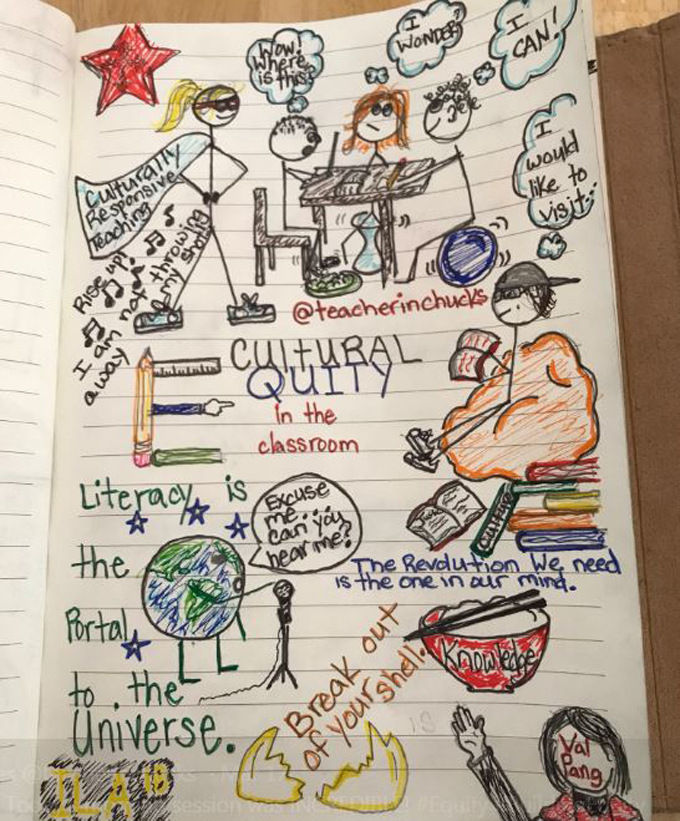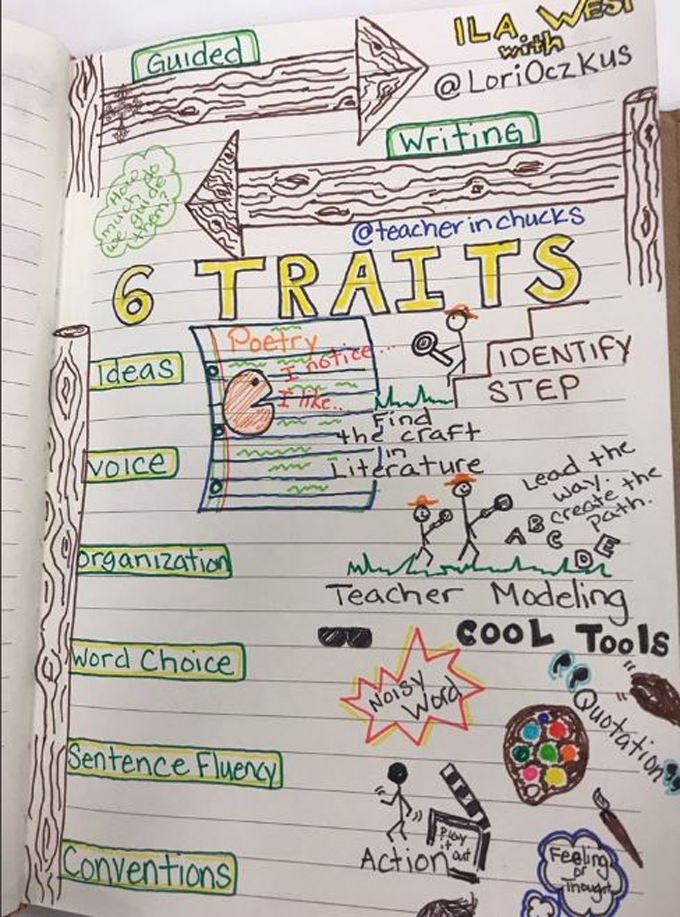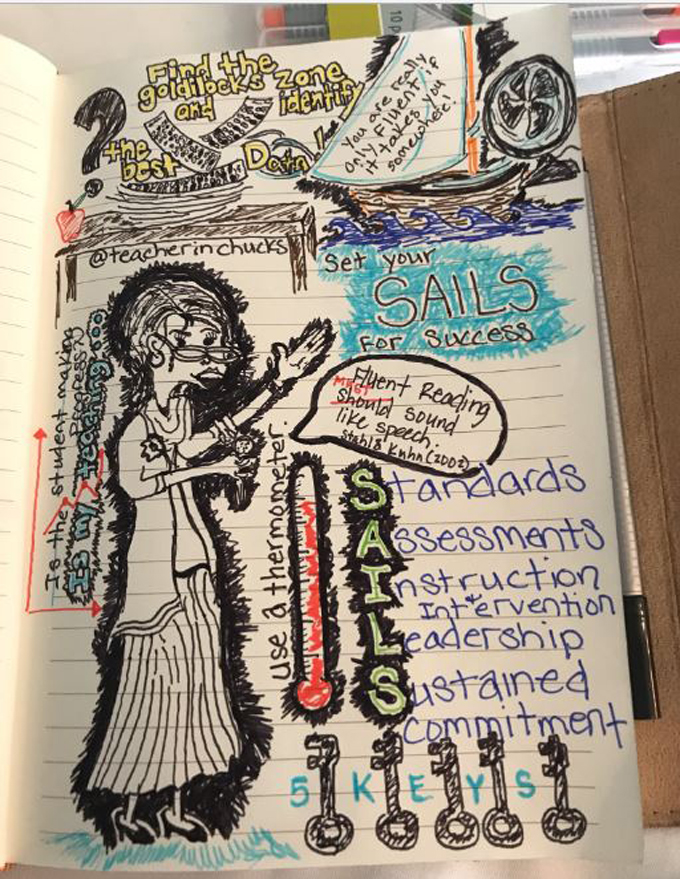 As a literacy educator, I am always interested in new instructional ideas that promote learning for my scholars. I was excited to see that ILA had restarted regional conferences and even more excited when I received the ILA tweet notifying members that there was a chance to win a complimentary two-day registration for ILA West 2018, taking place in San Diego, my hometown.
As a literacy educator, I am always interested in new instructional ideas that promote learning for my scholars. I was excited to see that ILA had restarted regional conferences and even more excited when I received the ILA tweet notifying members that there was a chance to win a complimentary two-day registration for ILA West 2018, taking place in San Diego, my hometown.
I won! I went! And I would like to share just a few highlights of the experience.
Three strands, three keynoters, and a panel of children’s literature authors comprised the smorgasbord of learning opportunities across the two days. Although I could not attend everything, here are a few main takeaways, shared through my mind-maps and words.
In the Teachers and Coaches Strand, Doug Fisher and Nancy Frey spoke about the importance of creating and cultivating assessment-capable learners—students who can assess their own learning—through purposeful and intentional instruction. Based on John Hattie’s research on the factors that affect student achievement, assessment-capable learners demonstrate an effect size of 1.44, which is more than three times the learning effect size of .4—the expected growth for one year of education.
 This session reminded me to evaluate my impact cycle to determine if I am encouraging my scholars to be aware of their current levels of understanding and then use their insights to identify their next learning steps, including deciding if they can proceed alone or if they need additional supports from me. It made me ask myself, Do my scholars know how to select the best tools to grow their learning? My scholars and I often talk about "moving from good to great" and say there is always room for growth. Because of this session, I want to empower my students to take charge of their own learning, to self-monitor, and to seek feedback.
This session reminded me to evaluate my impact cycle to determine if I am encouraging my scholars to be aware of their current levels of understanding and then use their insights to identify their next learning steps, including deciding if they can proceed alone or if they need additional supports from me. It made me ask myself, Do my scholars know how to select the best tools to grow their learning? My scholars and I often talk about "moving from good to great" and say there is always room for growth. Because of this session, I want to empower my students to take charge of their own learning, to self-monitor, and to seek feedback.
As a reading specialist, I was especially excited to attend sessions in the Early Literacy Educators Strand. I appreciated the opportunities Diane Lapp, Kelly Johnson, Aida Rotell, Hilda Martinez, and Lisa Forehand provided through their discussion of close reading and their live demonstration of guided reading with first-grade readers. They encouraged everyone to watch students’ movements while reading and to use these insights to promote comprehension when working with both small and large group reading instruction. The Q&A session allowed participants to gain a deepened understanding of their own practices as they reflected on and compared instructional moves. A lively conversation ensued with participants feeling empowered to improve their teaching practices.
 My coteachers and I discussed and left with an understanding of how to incorporate opportunities for guided reading and close reading during daily instruction, and how to use the assessment data to target areas for further instruction. Other highlights in the Early Literacy Educators Strand included Jan Hasbrouk’s discussion about the “goldilocks zone” of data collection and analysis; learning how to promote equitable instruction using culturally inclusive literature with Angie Zapata, Amy Seeley Flint, and their coleaders; practicing guided writing activities and strategies with Lori Oczkus; and learning about engaging comprehension and word study strategy with Hallie and Ruth Yopp.
My coteachers and I discussed and left with an understanding of how to incorporate opportunities for guided reading and close reading during daily instruction, and how to use the assessment data to target areas for further instruction. Other highlights in the Early Literacy Educators Strand included Jan Hasbrouk’s discussion about the “goldilocks zone” of data collection and analysis; learning how to promote equitable instruction using culturally inclusive literature with Angie Zapata, Amy Seeley Flint, and their coleaders; practicing guided writing activities and strategies with Lori Oczkus; and learning about engaging comprehension and word study strategy with Hallie and Ruth Yopp.
The day also included three outstanding keynote presentations by Glenn Singleton, Val Pang, and Stephen Peters that expanded everyone’s understanding of equity and how to promote it during daily instruction.
An additional highlight was the opportunity to connect with and share equity-related ideas with other educators from across the country. These two days of professional development made me excited to start each new teaching day with the intent of putting into practice all of the new ideas I learned. I look forward to having a similar experience at the ILA 2018 Conference in Austin, TX, this July.
Amy Miles is an English teacher and teacher leader at Health Sciences Middle School in San Diego, CA. You can find her on Twitter @teacherinchucks.